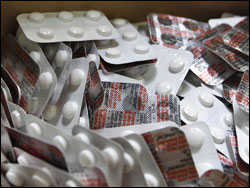Leading pharmaceutical companies are now making serious attempts to tie up with technology partners to enable their consumers identify genuine products in the market. Drug makers such as Ranbaxy Laboratories Ltd, Lupin Ltd, Glenmark Pharmaceuti-cals Ltd, Elder Pharmaceuticals Ltd and Unichem Laboratories Ltd are investing in resources and technological interventions to check the availability of counterfeit medicines in the market.
 In some cases, drug makers are spending as much as eight-10 per cent of a medicine pack's total production cost only on solutions to protect it from duplication and counterfeiting, according to company executives.
In some cases, drug makers are spending as much as eight-10 per cent of a medicine pack's total production cost only on solutions to protect it from duplication and counterfeiting, according to company executives.
"Quality, authentic products and services are no longer an exception, they are simply expected in today's marketplace. It is imperative that regulators and companies work together to ensure they set up systems and processes and adopt technologies that would ensure that authentic drugs reach the consumer," says Shakti Chakraborty, Lupin's group president for India and Commonwealth of Independent States.
The move of pharma companies has also opened up a market for various such technology service providers like PharmaSecure, Sproxil and specialised packaging companies like Bilcare. Now, consumers can simply SMS unique numeric PIN from drug packs to the service provider's number and receive a response on the authenticity. In some cases, one can also check secured codes on Internet.
"The idea is to connect with consumers directly through mobile phones, internet and even call centre services to establish authenticity of products. It is important because it maintains our brand-equity with the customer and also from supply chain perspective," said an official from another leading pharmaceutical company.
While the global counterfeit drug market is estimated to be around $75 billion (around Rs 4.12 lakh crore), in India it is likely to be around 20 per cent of the total Rs 65,000-crore (RS 650 billion) pharma market, or Rs 13,000 crore (Rs 130 billion).
According to industry officials and sector analysts, counterfeiting takes place mostly among the top-selling brands which include medicines for cough and cold, multi-vitamins and other acute diseases. Companies, therefore, necessarily implement such services on their best selling brands.
"Survey shows counterfeiting happens typically in top 25-30 best-selling brands. While every company's attempt is to protect all their products from counterfeiting, most of them would at least implement such technologies and premier packaging in their top brands," says Alok Saxena, joint managing director of Elder Pharma.
According to Chakraborty, Lupin has rolled out anti-counterfeiting solutions on all drugs manufactured directly by the company for the domestic market. The company also plans to implement such solutions on rest of its product portfolio in a phased manner.
However, experts suggest even small and mid size companies have stepped up to secure at least their top brands.
PharmaSecure, a software and technology company providing anti-counterfeiting solutions through mobile and internet technology, has nine pharma companies in India as its clients and currently has its verification codes on over 200 million products in the domestic market.
"We give a unique identity to every medicine pack, which is globally unique, along with a phone number where one can text or call to check authenticity," says Kishore Kar, vice-president-sales and marketing, PharmaSecure. The company has recently also partnered with Interpol, which will allow consumers to verify products containing unique security features with an application developed by Google.
In India, many companies have also opted for interesting packaging solutions to check counterfeiting of drugs. For instance, Glenmark uses colour coding on caps and unique hologram stickers on its bottles as a measure against counterfeiting. Similarly, Elder Pharma recently opted for a special laser packaging solution of Bilcare which carries a security code that cannot be read with naked eye.
"We not only deal with patients buying our products, but we also try to make doctors aware of it. It is important because doctors prescribe and are best enabled to counter the problem," Saxena said. Elder Pharma has so far implemented special packaging on its top-10 products and plan to gradually roll out the same across its portfolio.










 © 2025
© 2025